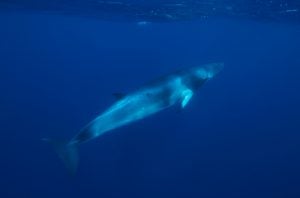
STRASBOURG (16 April 2019)—At the European Parliament’s final plenary session before the EU elections, MEPs voted in favour of a new Regulation on the conservation of fishery resources and the protection of marine ecosystems through technical measures, following many months of difficult negotiations between the European Parliament, Council and Commission. The proposed Regulation is intended to merge and simplify 33 different pieces of EU legislation, including the existing rules on cetacean bycatch. While some positive advances were made, the legislation adopted misses important opportunities to improve the protection of marine species and their habitats.
Dr Joanna Swabe, senior director of public affairs for Humane Society International/Europe, issued the following statement after the vote:
“The revision of bycatch rules had great potential to significantly increase protections for European cetacean populations and prevent the horrific and needless deaths of porpoises, dolphins and whales accidentally entangled in fishing gear. Unfortunately, the legislation that passed will only marginally improve the status quo.
“In the past few weeks alone, the mutilated corpses of hundreds of dolphins have washed up on French beaches; these poor animals represent only a fraction of the thousands who are accidentally killed by the fishing industry in the EU each year. Sadly, the legislation adopted today will likely continue to fail these sensitive species since the measures adopted for marine mammals are not sufficient to mitigate bycatch effectively.”
Swabe faulted MEPs and Member States for ignoring key information during the legislative process, saying, “They turned a blind eye to the recommendations of scientific experts, such as the ICES1 Bycatch Working Group, ASCOBANS2 and ACCOBAMS3. They also failed to take up the Commission’s proposal to require the use of Acoustic Deterrent Devices in specific marine areas where they are much needed.”
The legislation did include minor improvements to existing cetacean bycatch rules:
- The adoption of overarching objectives for technical measures adopted under the new framework, and a mechanism for monitoring and reporting on their effectiveness;
- A new requirement for EU Member States to provide information on the effectiveness of existing mitigation measures and monitoring arrangements with respect to bycatch of sensitive species, including cetaceans, seabirds and sea turtles;
- A requirement that Member States submit joint recommendations for additional mitigation measures for the reduction of incidental catches of these species;
- The inclusion of sea turtles in the technical conservation measures regulation – a species that had been overlooked in the Commission’s original proposal.
“So much more could have been achieved if the politicians had been more concerned with protecting marine species and their habitats, rather than the interests of the fishing industry,” said Swabe.
Facts
- The current EU cetacean bycatch legislation (Council Regulation (EC) No 812/2004) has been found to have significant weaknesses and is being repealed and incorporated into the proposed regulation on the conservation of fishery resources and the protection of marine ecosystems through technical measures (2016/0074).
- Technical measures are the rules for where, when and how fishing may take place. These measures are fundamental to regulating the impact of fishing on stocks and marine ecosystems, and they will play a key role in achieving some of the main objectives of the EU Common Fisheries Policy, such as implementing an ecosystem-based approach to fisheries management, minimising the impacts of fisheries on the wider environment and avoiding unwanted catches and gradual elimination of discards.
- The Commission proposal to require the use of Acoustic Deterrent Devices in the following fishing areas, where there is documented evidence of negative impacts on cetacean populations, was disregarded: VIa (west of Scotland), ICES sub-areas VIII and IXa (southwest waters), the Mediterranean and Black Seas.
END
Media contact: Jo Swabe, jswabe@hsi.org
1 International Council for the Exploration of the Sea
2 Agreement on the Conservation of Small Cetaceans of the Baltic, North East Atlantic, Irish and North Seas
3 Agreement on the Conservation of Cetaceans of the Black Sea, Mediterranean Sea and Contiguous Atlantic Area

